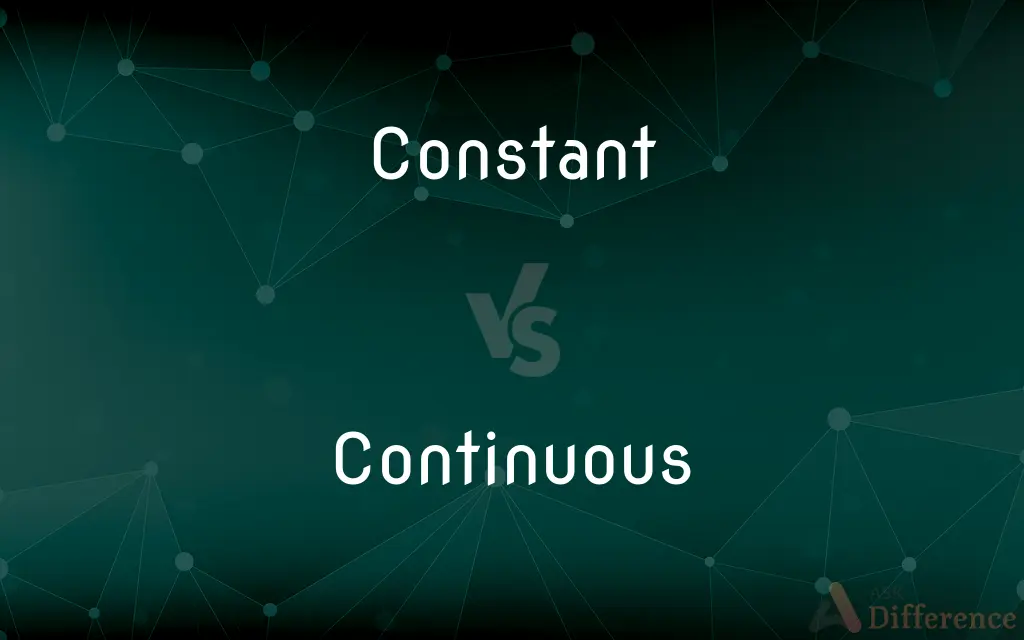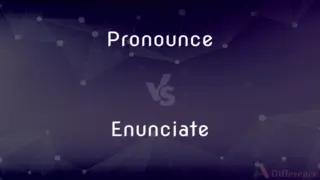Constant vs. Continuous — What's the Difference?
By Tayyaba Rehman — Updated on October 5, 2023
Constant refers to something unchanging or persistent. Continuous describes something uninterrupted or ongoing without breaks.

Difference Between Constant and Continuous
Table of Contents
ADVERTISEMENT
Key Differences
Constant" implies a state of stability or persistence where the condition or value remains the same over a period of time. "Continuous," on the other hand, speaks to an ongoing action or condition, emphasizing the absence of interruptions or breaks.
In mathematics, a "constant" is a number that remains the same throughout a problem or situation, whereas "continuous" would describe a function without breaks or gaps, persisting without end.
When referring to a person as "constant," it implies faithfulness or dependability, whereas describing a person’s action as "continuous" implies an activity being done without stopping.
Observing an action, a "constant" speed implies that the speed remains the same throughout the journey. Conversely, a "continuous" motion implies that the motion doesn’t stop but the speed could vary.
Essentially, while "constant" implies a static, unchanged status, "continuous" specifically highlights an ongoing, unpaused status. The former stresses steadiness in value, while the latter emphasizes an unbroken sequence.
ADVERTISEMENT
Comparison Chart
Change in Value/State
Unchanging value/state
Value/state may change
Duration
Not related to time
Involves time and is unending
Gaps or Breaks
Not applicable
No gaps or breaks
Application Example
Used in science to describe unchanging values
Used to describe ongoing actions
Mathematical Context
A number that doesn’t change
A function without gaps
Compare with Definitions
Constant
Unchanging in nature
The constant temperature was ideal for the experiment.
Continuous
Forming an unbroken whole
The continuous chain stretched across the path.
Constant
Persistent over time
She was a constant source of support during tough times.
Continuous
Extending without interruption
The path was continuous through the forest.
Constant
A fixed number in mathematics
Pi is a mathematical constant.
Continuous
Functioning without stopping
The continuous machinery improved production.
Constant
Not changing or varying; continuous
A constant gentle rain.
Drove at a constant speed.
Continuous
Ongoing without a break
Continuous efforts were made to resolve the issue.
Constant
Happening regularly or repeatedly; continual
The constant barking of the dog next door.
Constant interruptions.
Continuous
Uninterrupted in time
The continuous noise disrupted his concentration.
Constant
Unchanging in nature, value, or extent; invariable
A constant wind speed.
Continuous
Uninterrupted in time, sequence, substance, or extent.
Constant
Steadfast in purpose, loyalty, or affection; faithful
A constant friend.
Continuous
Attached together in repeated units
A continuous form fed into a printer.
Constant
Something that is unchanging or invariable.
Continuous
Of or relating to a line or curve that extends without a break or irregularity.
Constant
A quantity assumed to have a fixed value in a specified mathematical context.
Continuous
Of or relating to a function between two topological spaces such that the preimage of any open set in the range is an open set in the domain.
Constant
An experimental or theoretical condition, factor, or quantity that does not vary or that is regarded as invariant in specified circumstances.
Continuous
Without stopping; without a break, cessation, or interruption.
A continuous current of electricity
Constant
Unchanged through time or space; permanent.
Continuous
Without intervening space; continued.
A continuous line of railroad
Constant
Consistently recurring over time; persistent.
Continuous
(botany) Not deviating or varying from uniformity; not interrupted; not joined or articulated.
Constant
Steady in purpose, action, feeling, etc.
Continuous
Such that, for every x in the domain, for each small open interval D about f(x), there's an interval containing x whose image is in D.
Constant
Firm; solid; not fluid.
Continuous
Such that each open set in the target space has an open preimage (in the domain space, with respect to the given function).
Each continuous function from the real line to the rationals is constant, since the rationals are totally disconnected.
Constant
(obsolete) Consistent; logical.
Continuous
(grammar) Expressing an ongoing action or state.
Constant
Bounded above by a constant.
Constant time
Constant space
Continuous
Without break, cessation, or interruption; without intervening space or time; uninterrupted; unbroken; continual; unceasing; constant; continued; protracted; extended; as, a continuous line of railroad; a continuous current of electricity.
He can hear its continuous murmur.
Constant
That which is permanent or invariable.
Continuous
Not deviating or varying from uninformity; not interrupted; not joined or articulated.
Constant
(algebra) A quantity that remains at a fixed value throughout a given discussion.
Continuous
Continuing in time or space without interruption;
A continuous rearrangement of electrons in the solar atoms results in the emission of light
A continuous bout of illness lasting six months
Lived in continuous fear
A continuous row of warehouses
A continuous line has no gaps or breaks in it
Moving midweek holidays to the nearest Monday or Friday allows uninterrupted work weeks
Constant
(science) Any property of an experiment, determined numerically, that does not change under given circumstances.
Continuous
Of a function or curve; extending without break or irregularity
Constant
(computing) An identifier that is bound to an invariant value; a fixed value given a name to aid in readability of source code.
Constant
Firm; solid; fixed; immovable; - opposed to fluid.
If . . . you mix them, you may turn these two fluid liquors into a constant body.
Constant
Not liable, or given, to change; permanent; regular; continuous; continually recurring; steadfast; faithful; not fickle. Opposite of changeable and variable.
Both loving one fair maid, they yet remained constant friends.
I am constant to my purposes.
His gifts, his constant courtship, nothing gained.
Onward the constant current sweeps.
Constant
Remaining unchanged or invariable, as a quantity, force, law, etc.
Constant
Consistent; logical.
Constant
That which is not subject to change; that which is invariable.
Constant
A quantity that does not change its value; - used in countradistinction to variable.
Constant
A number whose value, when ascertained (as by observation) and substituted in a general mathematical formula expressing an astronomical law, completely determines that law and enables predictions to be made of its effect in particular cases.
Constant
A number expressing some property or condition of a substance or of an instrument of precision; as, the dielectric constant of quartz; the collimation constant of a transit instrument.
Constant
A data structure that does not change during the course of execution of a program. It may be a number, a string, or a more complex data structure; - contrasted with variable.
Constant
A quantity that does not vary
Constant
A number representing a quantity assumed to have a fixed value in a specified mathematical context;
The velocity of light is a constant
Constant
Persistent in occurrence and unvarying in nature;
Maintained a constant temperature
A constant beat
Principles of unvarying validity
A steady breeze
Constant
Continually recurring or continuing without interruption;
Constant repetition of the exercise
Constant chatter of monkeys
Constant
Steadfast in purpose or devotion or affection;
A man constant in adherence to his ideals
A constant lover
Constant as the northern star
Constant
Uninterrupted in time and indefinitely long continuing;
The ceaseless thunder of surf
In constant pain
Night and day we live with the incessant noise of the city
The never-ending search for happiness
The perpetual struggle to maintain standards in a democracy
Man's unceasing warfare with drought and isolation
Unremitting demands of hunger
Constant
Steadfast and faithful
His constant loyalty was admired by peers.
Constant
Regular and habitual
Her constant punctuality was appreciated.
Common Curiosities
Is a "constant" speed unvarying?
Yes, a "constant" speed means the speed remains the same throughout.
Does "continuous" mean without interruptions?
Yes, "continuous" describes an ongoing, unbroken sequence or status.
Can "constant" refer to loyalty?
Yes, "constant" can refer to someone or something stable and steadfast.
Does "constant" imply an ongoing status?
No, "constant" implies an unchanging, stable status, not necessarily ongoing.
Can something be "continuous" with varying values?
Yes, "continuous" implies no breaks, not unvarying values.
Can a function be "continuous" at a point?
Yes, a function can be "continuous" at a point if it meets specific criteria.
Is a "continuous" function always increasing or decreasing?
No, "continuous" only implies no breaks, not a specific direction of value.
Can a "continuous" action undergo changes?
Yes, a "continuous" action can undergo changes but without stopping.
Is a "constant" action unending?
Not necessarily; "constant" implies unchanging, not ongoing or unending.
Does "constant" care about time?
No, "constant" relates to unchanging status, not the persistence over time.
Can "continuous" refer to unbroken physical entities?
Yes, "continuous" can describe physical entities without breaks.
Is "continuous" used in mathematical contexts?
Yes, "continuous" describes a mathematical function without breaks or gaps.
Does "constant" describe unchanging numerical values?
Yes, in mathematics, a "constant" is a number that remains unchanged.
Can "constant" have variations?
Typically no, "constant" implies a consistent, unchanging state or value.
Can "constant" refer to regular, repeated actions?
Yes, "constant" can refer to actions that are regularly repeated.
Share Your Discovery

Previous Comparison
Pronounce vs. Enunciate
Next Comparison
Paratope vs. EpitopeAuthor Spotlight
Written by
Tayyaba RehmanTayyaba Rehman is a distinguished writer, currently serving as a primary contributor to askdifference.com. As a researcher in semantics and etymology, Tayyaba's passion for the complexity of languages and their distinctions has found a perfect home on the platform. Tayyaba delves into the intricacies of language, distinguishing between commonly confused words and phrases, thereby providing clarity for readers worldwide.














































